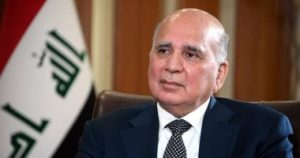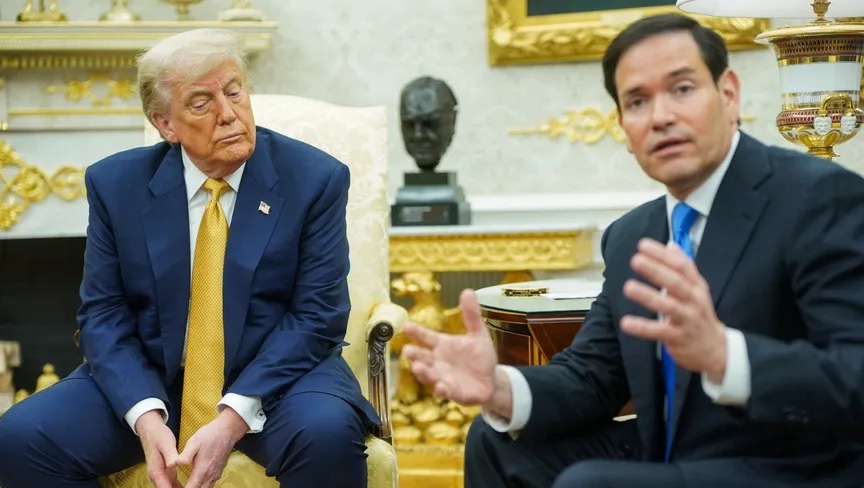À bien des égards, le processus de sécurité nationale n’existe plus.
Presque personne n’avait de réponses, si ce n’est pour pointer l’annonce publique de Trump concernant la frappe aérienne, car les responsables n’ont reçu aucun point clé sur ce qui devait être communiqué aux autres gouvernements.
Cela a été considéré comme un indicateur de l’éloignement de Trump par rapport à l’approche politique américaine traditionnelle, adoptant une méthode “centralisée et improvisée” pour les décisions de sécurité nationale.
Il a réduit le rôle du personnel du Conseil de sécurité nationale, sur lequel les présidents précédents comptaient pour superviser les options politiques, assurer la mise en œuvre des décisions présidentielles et coordonner avec les gouvernements étrangers.
Le nombre de conseillers a été réduit, le personnel du conseil passant à moins de 150 personnes contre environ 400 lors des administrations précédentes.
Trump a limogé le conseiller à la sécurité nationale Mike Wess trois mois après sa prise de fonction, confiant la tâche au secrétaire d’État Marco Rubio pour qu’il l’assume en plus de son rôle de principal diplomate américain.
En conséquence, Trump s’est appuyé sur un petit nombre de conseillers principaux.
La porte-parole de la Maison Blanche, Caroline Leavitt, a déclaré qu’il s’agissait “d’une approche descendante. Les administrations précédentes voulaient peut-être tout dire à tout le monde pour les satisfaire, mais nous ne nous soucions pas si quelqu’un se sent contrarié. Nous voulons juste faire le travail.”
Cependant, des responsables et des critiques ont averti que cette approche nuisait davantage à l’administration Trump qu’elle ne lui profitait.
David Rothkopf, auteur d’un livre sur l’histoire du Conseil de sécurité nationale et fervent critique de Trump, a déclaré : “À bien des égards, le processus de sécurité nationale n’existe plus.”
Rothkopf estime que Trump représente à lui seul le système de sécurité nationale.
Il a ajouté : “Le Département d’État, l’état-major interarmées et le Conseil de sécurité nationale sont tous réunis en une seule personne.”
Les critiques estiment que le système actuel prive Trump des avis d’experts au sein du gouvernement qui pourraient l’aider à formuler des politiques, et que les responsables chargés d’exécuter ses ordres manquent souvent des détails nécessaires, ce qui entraîne des retards, des erreurs voire de la négligence.
Cette approche a également encouragé certains hauts responsables à agir de manière indépendante pour attirer l’attention de la Maison Blanche et faire passer leurs propres priorités.
En mai dernier, Troy Vitterl, alors responsable principal des affaires africaines au département d’État américain, a annoncé lors d’un discours en Côte d’Ivoire une réunion de haut niveau avec des pays africains en marge de l’Assemblée générale des Nations Unies prévue en septembre, axée sur le commerce et l’investissement.
Vitterl a révélé l’idée avant qu’elle ne soit officiellement inscrite à l’ordre du jour de Trump, selon des responsables de l’administration.
Il avait également prévu de visiter le Royaume-Uni avant la réunion de l’ONU, ce qui laissait peu de temps pour rencontrer les dirigeants africains.
Les responsables et diplomates n’ont reçu aucune instruction de la Maison Blanche pour organiser la réunion.
Des assistants de l’administration ont expliqué que Trump avait déjà reçu plusieurs dirigeants africains à la Maison Blanche et prévoyait d’autres rencontres avec ses homologues du continent.
Durant son court mandat, Wess a intégré au Conseil de sécurité nationale plusieurs assistants chevronnés du Congrès et des responsables ayant servi lors du premier mandat de Trump.
Cependant, certains ont été rapidement licenciés après avoir été accusés de “manque de loyauté” par des influenceurs d’extrême droite comme Laura Loomer, tandis que d’autres ont démissionné après le limogeage de Wess.
Wess et le général Michael Kurilla, alors commandant du Commandement central américain (CENTCOM), ont convaincu Trump en mars de lancer des frappes aériennes de plusieurs semaines contre les Houthis au Yémen, malgré l’opposition de la majorité de son équipe de sécurité nationale à l’opération.
L’équipe de sécurité nationale a justifié sa position par la nécessité de préserver le stock limité de munitions américaines en prévision d’une guerre possible avec la Chine, soulignant que le groupe classé “terroriste” ne se rendrait pas simplement à cause des bombardements américains.
Mais seulement deux mois après le début de la campagne, Trump a brusquement changé de cap, annonçant l’accord des Houthis pour cesser les attaques contre les navires américains.
Cependant, leurs attaques contre Israël et les navires d’autres pays ont continué.
Après avoir pris ses fonctions de conseiller à la sécurité nationale en mai, le secrétaire d’État Marco Rubio a défendu une réduction importante du personnel du conseil, visant à lui rendre son rôle original de coordination inter-agences plutôt que d’organe consultatif.
Les responsables ont déclaré que cette approche correspond davantage au style hiérarchique de gouvernance de Trump.
Des responsables actuels et anciens ont confirmé que cette approche réduit le risque de fuites qui ont entravé le premier mandat de Trump, et lui permet ainsi qu’à un cercle restreint de conseillers de prendre des décisions rapidement, au lieu d’entrer dans de longues discussions.
Gordon Sondland, qui a été ambassadeur de Trump auprès de l’Union européenne lors de son premier mandat, a déclaré : “Il y a beaucoup de râleurs dans les couloirs du Conseil de sécurité nationale qui se plaignent que leur voix n’est pas entendue, alors qu’en réalité, il se peut qu’il n’y ait pas besoin que leur voix soit entendue.”
Les opérations quotidiennes du conseil sont supervisées par les adjoints au conseiller à la sécurité nationale Andy Baker et Robert Gabriel, ainsi que par Mike Needham, conseiller au département d’État.
Ils détaillent les ordres généraux de Trump et les partagent avec les hauts responsables avant ses réunions.
L’administration du président Donald Trump a commencé vendredi des réformes radicales du Conseil de sécurité nationale, se préparant à redistribuer des centaines d’employés et à consolider le pouvoir avec des assistants de confiance.
Condoleezza Rice, qui a été conseillère à la sécurité nationale sous l’administration de George W. Bush, a déclaré lors du Forum de sécurité d’Aspen en juillet dernier : “Ils n’ont plus ce processus ascendant auquel nous étions peut-être habitués. Je ne pense pas qu’on puisse établir une recette extérieure pour le processus du Conseil de sécurité nationale, cela dépend beaucoup du président.”
L’envoyé de la Maison Blanche Steve Witkoff contacte souvent Trump directement après avoir rencontré le président russe Vladimir Poutine et d’autres dirigeants, mais les résumés de ces conversations atteignent rarement les institutions gouvernementales.
Leavitt a déclaré : “Nous n’attendons rien de plus” de Witkoff que des briefings pour Trump et les membres seniors de l’équipe de sécurité nationale.
Avec la réduction du conseil, Trump se trouve parfois hors du circuit d’information.
Il a été surpris en juillet par la décision du Pentagone de geler les livraisons d’armes à l’Ukraine après un examen des stocks, suite à l’annonce du gel.
Trump a annulé la décision environ une semaine plus tard.













Recommended for you
مدينة المعارض تنجز نحو 80% من استعداداتها لانطلاق معرض دمشق الدولي
طالب الرفاعى يؤرخ لتراث الفن الكويتى فى "دوخى.. تقاسيم الصَبا"
تقديم طلبات القبول الموحد الثلاثاء و640 طالبا سيتم قبولهم في الطب
البريد المصري: لدينا أكثر من 10 ملايين عميل في حساب التوفير.. ونوفر عوائد يومية وشهرية وسنوية
سمو الشيخ عيسى بن سلمان بن حمد آل خليفة يستقبل سفير الولايات المتحدة الأمريكية لدى مملكة البحرين
الجغبير: القطاع الصناعي يقود النمو الاقتصادي